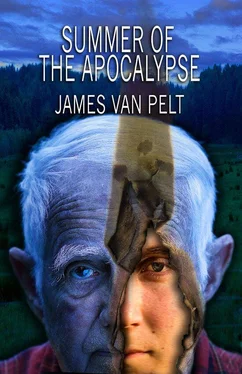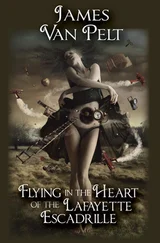How will I find Dad in all this? The world had never seemed so big.
Smoke billowed from the Coors plant. Wind swirled the impenetrable darkness, and for a second, the black clouds formed the shape of the great ape. Just for a brief instant, Eric could see King Kong straddling the wreckage of Golden. Just for an instant he could hear him shrieking his challenge at the powers of the earth, and at this instant, there was no one to answer.
Chapter Seven
CROSSROADS, COMING AND GOING
“Are we still being watched?” asked Eric. Rabbit shrugged his shoulders. “Maybe.” He stopped, scanned the edges of the canyon, then tilted his head to the side as if listening. “Yes.”
“How do you know that kind of stuff? I can’t do that,” said Dodge crossly. “You give me the heebie-jeebies.”
Rabbit shrugged again. “Sometimes I get a feeling.”
Eric laughed. Sometimes he’d felt they were being watched too. It wasn’t anything big, a shiver when he wasn’t cold, a sense of being on stage, of things moving behind him or just below the horizon. It made him want to run around bushes and yell, “Boo!”
Rain clouds swelled to the east. Thunderhead piled on thunder-head like mushroom clouds, and flickers of lightning flashed at their base. The plains are getting a washing, Eric thought. During the Gone Times, he didn’t pay attention to the weather. Buildings were air conditioned, artificially lighted and always dry. Car heaters held out cold or rain or snow. Now, he checked the weather automatically. Red sky at morning, sailors take warning. Red sky at night, sailors delight.
They hiked quietly for several minutes. Eric decided the storm would stay out on the plains. They needn’t worry about finding shelter from wind or rain tonight. He snapped a glance over his shoulder, trying to catch whatever might be following them, but he saw nothing. Rabbit walked in front of him nonchalantly. If Rabbit wasn’t frightened, then there was probably no need for him to fret. Rabbit “intuited” better than anyone he had ever met.
“What kind of car did you have, Grandpa?” asked Dodge. Eric surveyed the path before them. Following U.S. 6, they had turned into Clear Creek Canyon a half hour earlier, but a rock slide covered the highway now and they would have to pick their course carefully over the broken and loose rock. Heat waves shimmer off the rock-strewn slope. He could see almost no evidence of the line of gun-shot riddled cars he remembered from years ago. The slide had buried them.
“I drove several, but I didn’t really have one.” He decided to head down to the river. The rocks looked less steep and jumbled there. “I was too young to get a driver’s license before the plague, and there didn’t seem much point in owning one particular car afterward. For a year or so, everybody who was left could own a hundred cars if they wanted to.”
Dodge jumped from rock to rock like a mountain sheep. Eric shook his head ruefully. He couldn’t recall the last time he felt that limber and careless of his well being. He continued, “Of course, that was only for a year as I said.”
“How come we don’t have cars now? Phil said he still had some that worked. I sure would have liked to drive in one. It’d save us from a lot of walking.”
Rabbit sat next to the river, waiting for them to catch up. “Car won’t do you any good where we’re going,” he said. He gestured up stream where the river tumbled through the clutter of boulders. “We’ll be on a path soon enough,” said Eric. He remembered the fishing trail that went away from the highway at the old, blocked tunnel. “But Rabbit’s right. Most places I expect a car won’t go too far. A car needs a very special environment, a road, and the roads are falling apart.” He lowered himself onto a rock that overlooked a deep pool in Clear Creek. Five trout a foot or so long each lazily swam to the other side when his shadow fell on the water. Heat broadcast from each sun-baked rock. Eric jerked his hand off the black granite. The stream looked refreshing and cold. “I suppose in some parts of the country, the roads will stay good for centuries. After all, when I was a child there were places in the prairie where one could still see one-hundred year old ruts left by covered wagons. If ruts can last that long, highways ought to also. Mountains and winter, though, are tough on roads, and a car needs good ones to get anywhere.”
“Why don’t we fix them?” asked Dodge. Rabbit said, “Cars don’t work.”
“Phil said something interesting I hadn’t thought about.” Eric led them upstream. A rusted mass of metal jammed between two rocks showed that they were at least to the point where the Cars had been parked, which would put them within a few hundred yards of the tunnel, but looking ahead, Eric couldn’t tell. Time had reshaped the canyon. “He said it’s all a problem of shelf life. Some things last and others don’t. A car will last a long time if you keep it out of the weather, but two of its elements Won’t, the battery and gasoline. You can run a car without a battery, but gasoline has additives that evaporate over time no matter where it’s stored. A couple years after the plague, it became very hard to find gasoline that was usable. Without fresh gasoline, most cars can’t run, and no one has made gasoline for sixty years. So, gasoline’s shelf life stopped the car a lot sooner than bad roads.”
“Why is diesel still good and gasoline isn’t?” “Diesel has no octane.” Dodge looked at Eric blankly.
“Octane is what gives gasoline its power. Diesel is mostly oil. It doesn’t evaporate or change chemically as quickly as the octane in gasoline. We can find out more about gasoline and chemistry if the library in Boulder still stands.”
Dodge grinned, “Books will tell us everything!” Eric sighed. Dodge’s enthusiasm for reading as a cure all depressed him. “Reading, study, and careful thought may teach us how to make gasoline again, but cars are just a small part of this shelf life problem.”
Climbing around a particularly treacherous stretch of sharp-edged rock silenced them for a minute. Eric spotted where the slide ended and the fishing trail, as fresh and vivid as when he last saw it, began. After they stepped off the slide, they splashed water in their faces and cooled their necks on a grassy shore by the creek. Dodge refilled their canteens.
They picked up their backpacks, but didn’t put them on as they looked for a comfortable place to eat lunch. Above the trail, Rabbit found a spot of soft grass shaded by a juniper, and they sprawled comfortably.
“What else about shelf life?” asked Dodge. Eric wished he had a cigarette. He had only smoked tobacco for two or three years after the plague, but the urge still hit him strongly sometimes. “This is kind of a lecture,” he said.
“We don’t mind, do we, Rabbit?” Rabbit shook his head. Dodge said, “We like your stories.”
“Well, this isn’t a story.” He dug into his pack for a jar of crabapple jelly. “A loaf of bread stays fresh for a week if you keep it wrapped up, right?”
Dodge held out a hard biscuit for Eric to put jelly on. “Right.”
“Well, then we can say its shelf life is one week. Shelf life is how long something stays good. Bread has a short life unless you freeze it; then it lasts longer.”
Dodge said, “But we can’t freeze things because we don’t have ’lectricity.”
“Right. But this isn’t a problem because flour, salt, sugar, eggs and yeast either have long shelf lives or are always available. Shelf life, though, doesn’t just apply to food. Lots of technology from the Gone Time had limited shelf life. Batteries, for example, are fairly obvious. A battery stays good for up to five years, or so, then it’s dead. Even a rechargeable one. Ammunition, gasoline, florescent light bulbs and many medicines chemically degenerate. The problem is that we don’t have access to the raw materials, or we don’t have the technology in place, to replace the items with limited shelf lives. Imagine if we didn’t have flour, salt, sugar, eggs and yeast how long it would take to run out of bread.” Dodge said, “Well, we could store up a bunch and it would last a long time.” Rabbit said, “Shelf life. One week. Doesn’t matter how much you have.”
Читать дальше












